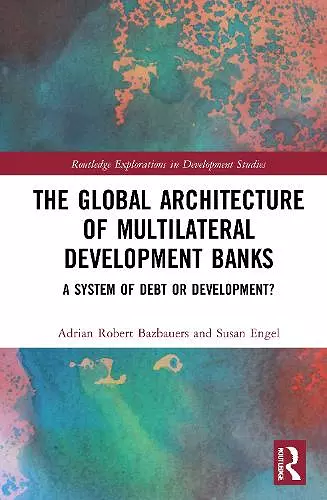The Global Architecture of Multilateral Development Banks
A System of Debt or Development?
Susan Engel author Adrian Robert Bazbauers author
Format:Paperback
Publisher:Taylor & Francis Ltd
Published:26th Sep '22
Currently unavailable, and unfortunately no date known when it will be back
This paperback is available in another edition too:
- Hardback£145.00was £145.00(9780367440244)

This book explores the evolution of the 30 functioning multilateral development banks (MDBs). MDBs have their roots in the growing system of international finance and multilateral cooperation, with the first recognisable MDB being proposed by Latin America in financial cooperation with the US in the late 1930s. That Inter-American Bank did not eventuate but was a precursor to the World Bank being negotiated at Bretton Woods in 1944. Since then, a complex network of regional, sub-regional, and specialised development banks has progressively emerged across the globe, including two significant recent entrants established by China and the BRICS.
MDBs arrange loans, credits, and guarantees for investment in member states, generally with the stated aim of fostering economic growth. They operate in both the Global North and South, though there are more MDBs focusing on emerging and developing states. While the World Bank and some of the larger regional banks have been scrutinised, little attention has been paid to the smaller banks or the overall system. This book provides the first study of all 30 MDBs and it evaluates their interrelationships. It analyses the emergence of the MDBs in relation to geopolitics, development paradigms and debt. It includes sections on each of the banks as well as on how MDBs have approached the key sectors of infrastructure, human development, and climate.
This book will be of particular interest to researchers of development finance, global governance, and international political economy.
"The key contribution of this path-breaking work by Adrian Bazbauers and Susan Engel lies in it approaching the world’s 30 MDB’s as essentially parts of a system. They argue that the substantial resources that these institutions can muster and deploy to developing countries are only half the story when it comes to accounting for their formidable impact. Employing a neo-Gramscian/constructivist theoretical framework, the authors show how in response to the setbacks that have shaken neoliberalism in the late 20th and early 21st centuries, the MDB ideological complex has played a vital role in neoliberalism’s adapting to its crisis of legitimacy while still maintaining its position as hegemonic ideology. This status is, however, increasingly fragile, and Bazbauers and Engel guide us in exploring the points of vulnerability where alternatives to neoliberalism might be able to break through." -- Walden Bello, Adjunct Professor of Sociology, State University of New York at Binghamton and co-founder, Focus on the Global South
"In this comprehensive and opportune book, Bazbauers and Engel approach the multilateral development banks from the perspective that collectively they constitute a system of development institutions. From this point of view, they offer fresh insights into the operations of MDBs that are household names as well as MDBs that have been overlooked by scholars. Through their rich analysis of these institutions Bazbauers and Engel reveal the confluence of ideas, power, and global structures that comprise multilateral development finance. As someone who has written on the development banks since the 1990s, this is the most important work on the MDBs I have read in years." -- Jonathan R. Strand, Professor of Political Science, University of Nevada Las Vegas, USA
ISBN: 9780367708122
Dimensions: unknown
Weight: 453g
286 pages